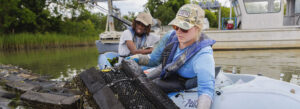Policy in Practice: Law Students Assist with Coastal Adaptation Master Plan
After learning about environmental law in classrooms, two students gained a new perspective on how coastal policy plays out at the state level. Sasha Brauer, then a third-year law student at William & Mary Law School, and Lesley Morton, a first-year law student at the University of Richmond, assisted Rear Admiral Ann Phillips, the special assistant to the governor for coastal adaptation and protection.
During their Coastal Flooding and Protection Fellowships, Brauer and Morton conducted research for Phillips for the Virginia Coastal Resilience Master Plan. The master plan will set priorities for reducing the impacts of tidal and storm-surge flooding, and coordinate those efforts at local, state, and federal levels.
“We want to focus on natural and nature-based features first, and align efforts in that context,” Phillips said. “We’re going after the most vulnerable and critical areas now, and then spreading out from there, and looking at how do we best do that.”
Priorities in resilience planning
At the onset of the master plan process, Brauer conducted background research for Phillips as she surveyed adaptation projects already in progress throughout the state and looked at potential funding sources for resilience efforts.
“She’s putting together different pieces, and meeting with different people to see…what’s happening with state agencies,” Brauer said.
Brauer’s first exposure to environmental policy came from the Virginia Coastal Policy Center at W&M Law School. Brauer assisted communities participating in the Resilience Adaptation Feasibility Tool (RAFT) and helped facilitate workshops where communities made action plans for their towns.
“That was really the first time I’d been on the ground, connecting and realizing what these coastal communities face,” Brauer said.
Working with Phillips, Brauer saw a different side of environmental policy—the legwork required for coordination across state agencies.
“I am understanding a little bit more about how to effectively advocate for an issue that needs to be addressed,” Brauer said. “Part of that is dealing with all the players figuring out the mechanics of how to do that.”
Aligning resilience projects in the Commonwealth
One of the first steps to assembling the master plan is evaluating the coastal resilience efforts that are already underway in state agencies—everything from highway restoration efforts to tracking local declines in insects. Morton managed a running list of projects related to the master plan for easy reference.
“The tracking sheet is going to be vital for keeping us organized and making sure the data is available and ready,” Morton said.
Although the fellowship taught Morton about the process of coastal adaptation in Virginia, she was no stranger to flood impacts after working in legal aid after hurricanes Katrina, Ike, and Rita.
“I am understanding a little bit more about how to effectively advocate for an issue that needs to be addressed,” Brauer said. “Part of that is dealing with all the players figuring out the mechanics of how to do that.”
“Having that experience on cases and understanding what hurricane survivors are going through—especially in impoverished communities—was really impactful for me,” Morton said.
After learning more about climate change research at a science association in Washington, D.C., and after working for AmeriCorps VISTA and in legal aid, Morton wanted to learn how state governments address climate change. This led her to law school and the fellowship with Phillips.
“I’ve really liked learning more about her work and what is going on in the field for climate adaptation,” Morton said. “It’s very near to my heart, and I want to make sure that I understand what’s going on so that I can apply that to my career in the future.”
Phillips said Brauer and Morton’s assistance during the spring was helpful as she gathered initial information for the coastal resilience master plan.
“That’s been invaluable, and I think it’ll have a tremendous positive impact on the outcomes,” Phillips said.
Takeaways:
- As the special assistant to the governor for coastal adaptation and protection, Rear Admiral Ann Phillips is creating a coastal master plan to set priorities for the Commonwealth’s coastal adaptation projects and align local, state, and federal efforts.
- Two law students assisted Phillips during the spring semester to inventory the state’s current resilience projects.
- The students’ fellowships gave them hands-on experience in coastal policy at the state level.
Photos and video by Aileen Devlin | Virginia Sea Grant
Story by Madeleine Jepsen | Virginia Sea Grant
Published Sept. 6, 2019.
“I think it’ll have a tremendous positive impact on the outcomes,” Phillips said.
“I’ve really liked learning more about her work and what is going on in the field for climate adaptation,” Morton said.





